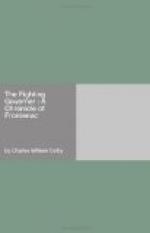It is worthy of remark that each of the contestants, Frontenac, Laval, and Duchesneau, has his partisans among the historians of the present day. All modern writers agree that Canada suffered grievously from these disputes, but a difference of opinion at once arises when an attempt is made to distribute the blame. The fact is that characters separately strong and useful often make an unfortunate combination. Compared with Laval and Frontenac, Duchesneau was not a strong character, but he possessed qualifications which might have enabled him in less stormy times to fill the office of intendant with tolerable credit. It was his misfortune that circumstances forced him into the thankless position of being a henchman to the bishop and a drag upon the governor.
Everything which Duchesneau did gave Frontenac annoyance— the more so as the intendant came armed with very considerable powers. During the first three years of Frontenac’s administration the governor, in the absence of an intendant, had lorded it over the colony with a larger freedom from restraint than was normal under the French colonial system. Apparently Colbert was not satisfied with the result. It may be that he feared the vigour which Frontenac displayed in taking the initiative; or the quarrel with Perrot may have created a bad impression at Versailles; or it may have been considered that the less Frontenac had to do with the routine of business, the more the colony would thrive. Possibly Colbert only sought to define anew the relations which ought to exist between governor and intendant. Whatever the motive, Duchesneau’s instructions gave him a degree of authority which proved galling to the governor.
Within three weeks from the date of Duchesneau’s arrival the fight had begun (September 23, 1675). In its earliest phase it concerned the right to preside at meetings of the Sovereign Council. For three years Frontenac, ’high and puissant seigneur,’ had conducted proceedings as a matter of course. Duchesneau now asked him to retire from this position, producing as warrant his commission which stated that he should preside over the Council, ’in the absence of the said Sieur de Frontenac.’ Why this last clause should have been inserted one finds it hard to understand, for Colbert’s subsequent letters place his intention beyond doubt. He meant that Duchesneau should preside, though without




